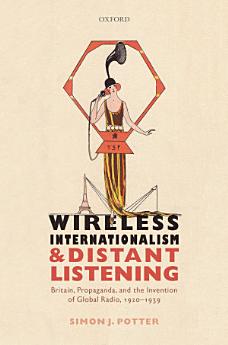Wireless Internationalism and Distant Listening: Britain, Propaganda, and the Invention of Global Radio, 1920-1939
May 2020 · Oxford University Press
Ebook
256
Pages
family_home
Eligible
info
reportRatings and reviews aren’t verified Learn More
About this ebook
During the 1920s and 1930s the new medium of radio broadcasting promised to transform society by fostering national unity and strengthening and popularising national cultures. However, many hoped that 'wireless' would also encourage international understanding and world peace. Intentionally or otherwise, wireless signals crossed borders, bringing talk, music, and news to enthusiastic 'distant listeners' in other countries. In Europe, radio was regulated through international consultation and cooperation, to restrict interference between stations, and to unleash the medium's full potential to carry programmes to global audiences. A distinctive form of 'wireless internationalism' emerged, reflecting and reinforcing the broader internationalist movement and establishing structures and approaches which endured into the Second World War, the Cold War, and beyond. This study reveals this untold history. Wireless Internationalism and Distant Listening also explores the neglected interwar experience of distant listening, revealing the prevalence of listening across borders and explaining how individuals struggled to overcome unwanted noise, tune in as many stations as possible, and comprehend and enjoy what they heard. The volume shows how radio brought the world to Britain, and Britain to the world. It revises our understanding of early BBC broadcasting and the BBC Empire Service (the precursor to today's World Service) and shows how government influence shaped early BBC international broadcasting in English, Arabic, Spanish, and Portuguese. It also explores the wider European and trans-Atlantic context, demonstrating how Fascism in Italy and Germany, the Spanish Civil War, and the Japanese invasion of China, combined to overturn the utopianism of the 1920s and usher in a new era of wireless nationalism.
About the author
Simon J. Potter is Professor of Modern History at the University of Bristol. He has published widely on the history of the mass media and the history of empire, and his work brings together themes, ideas, and debates from these two fields. He has also written extensively on the wider historiographies of the British Empire and the British World, and on recent developments in Global History. His publications include Broadcasting Empire: the BBC and the British World, 1922-1970 (2012), British Imperial History (2015), and News and the British World: the Emergence of an Imperial Press System, 1876-1922 (2003). He has led a Leverhulme Trust International Network on global radio history and worked with heritage groups in Bristol on public engagement with the legacies of empire.
Rate this ebook
Tell us what you think.
Reading information
Smartphones and tablets
Install the Google Play Books app for Android and iPad/iPhone. It syncs automatically with your account and allows you to read online or offline wherever you are.
Laptops and computers
You can listen to audiobooks purchased on Google Play using your computer's web browser.
eReaders and other devices
To read on e-ink devices like Kobo eReaders, you'll need to download a file and transfer it to your device. Follow the detailed Help Center instructions to transfer the files to supported eReaders.






